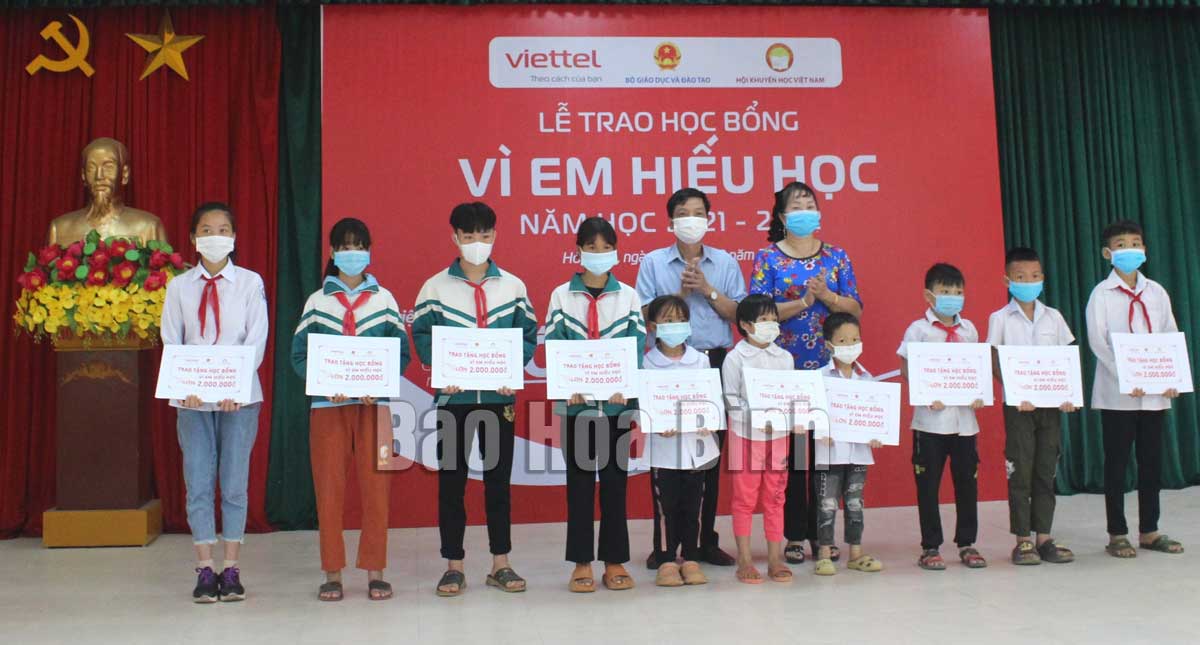
(HBO) - Lac Son District has the highest number of schoolchildren among the province’s regions, amounting to 33.327 pupils. Remarkably, schoolgoers of ethnic minorities make up 92% of total students. Many among 13 communes categorized as specially underprivileged areas (SUA) have up to 97-98% pupils of ethnic minority backgrounds.

Representatives
from Lac Son District Education and Training Department, Study Encouragement
Society and Hardworking Poor Pupil Foundation at "Studious pupils” scholarship
event sponsored by Viettel Hoa Binh.
Due to reinforced investment of resources, district schools
were equipped with basically sufficient material facilities for school year
2021-2022, said Bui Van Danh, Director of District Education and Training
Department. Through procurement and purchase bids, the district authorities
allocated priorities for facilities striving for "National Standard School”
title and those in underprivileged areas. Schools with dilapidated refectories
and toilets were screened and catalogued for repairs and overhauls.
On the other hand, for schools in SUAs, the district
authorities assign priorities in allocating and supplementing competent
teaching staff with distinguished records, especially those in charge of first
grade classes in order to achieve parity between areas of disparate conditions.
Furthermore, special attention was regularly paid towards pupils of ethnic
minorities, campaigning 100% them to attend school. In order to ensure pupils’
benefits and rights, the schools were provided with close instructions about
material facilities and curriculum preparedness. Emulation movement "Two goods”
(good teachers, good pupils) was constantly promoted.
The district authorities implemented precise, adequate and
timely measures in realizing the policies of the Party and State toward pupils
of ethnic minorities in SUAs, with state expenses for students amounting to 20
billion VND per year. Besides, numerous programs, welfare and study
encouragement activities were introduced to support the students, particularly
Viettel Hoa Binh’s "Studious pupils” scholarships, Ve hamlet school built with
funds from VOV…, along with gifts and assistance packages from various
charities and philanthropists.
Given
the support and investments, conditions for pupils of ethnic minorities in SUAs
have seen remarkable improvements, narrow the gap in education disparity. 21
out 58 facilities, or 36,2%, have qualified as "National Standard School”.
More than just an information technology teacher, Bui Van Nien is an inspiring figure who has nurtured the scientific curiosity and creative spirit of students in Vietnam’s ethnic minority communities.
Da Bac is the most disadvantaged mountainous district in Hoa Binh province, with ethnic minorities accounting for about 90% of its population. Over the past years, the district has mobilised resources to implement ethnic policies to improve the quality of life of local people.
In recent years, Hoa Binh province has consistently prioritised the protection, care, and education of children, particularly those from ethnic minorities and disadvantaged backgrounds, by creating a safe, healthy, and nurturing environment for their all-round development.
The Steering Committee for Tobacco Harm Prevention and Control of Hoa Binh province, in coordination with the Tobacco Harm Prevention and Control Fund, held a ceremony on May 28 in response to the World No Tobacco Day (May 31) and the National No Tobacco Week (from May 25 to 31). The event was chaired by Nguyen Van Toan, Standing Vice Chairman of the provincial People’s Committee and head of the Steering Committee.
Since 2021, the Center for Industrial Promotion and Industrial Development Consulting (CIIDC) under the Department of Industry and Trade has been implementing a school lighting model as part of the plan for using energy efficiently and economically in Hoa Binh Province in the pẻiod of 2021 - 2025. This model not only aims to improve the learning conditions and enhance the education quality, but it also promotes the message of energy saving, energy security, environmental protection and contributes to the goals of socio-economic development.
In the 2024 - 2025 school year, the entire Hoa Binh provincial education sector includes 520 educational institutions and schools. Among them are 13 ethnic boarding schools with 153 classes and 4,487 students. Four of these schools have met national standards, reaching 30.7 percent.



